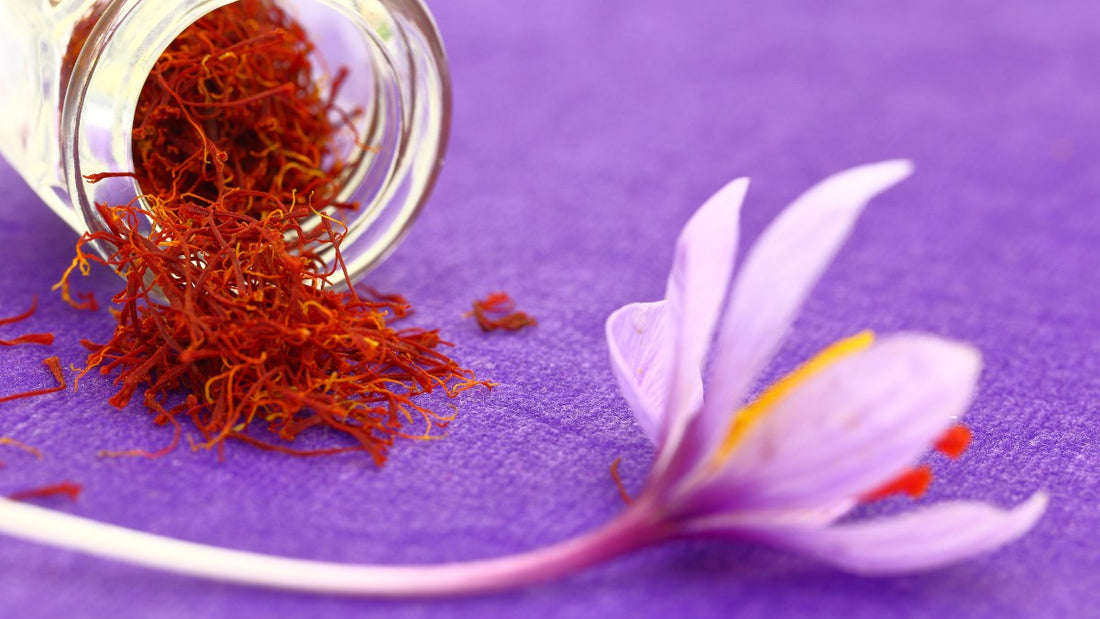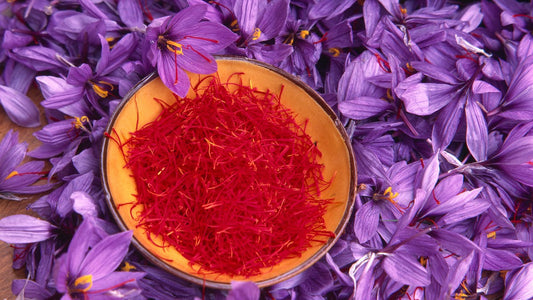
Saffron Health Benefits: A Comprehensive Guide to Nature's Gold
Ara OhanianShare
Saffron, often referred to as "red gold," is not only one of the world's most prized spices but also a treasure trove of health benefits. Derived from the flower of Crocus sativus, saffron has been used for centuries in traditional medicine and culinary arts. Today, modern science has uncovered numerous health benefits associated with this vibrant spice, making it a powerful addition to your wellness routine. In this blog, we’ll dive deep into the saffron health benefits that make it a must-have in your kitchen and medicine cabinet.
1. Saffron for Mental Health and Mood Improvement
One of the most widely recognized saffron health benefits is its ability to improve mental health. Saffron contains powerful compounds like crocin and safranal, which have been shown to boost mood and reduce symptoms of depression and anxiety.
- Natural Antidepressant: Research suggests that saffron may be as effective as certain prescription medications in treating mild to moderate depression without the side effects.
- Stress Relief: The spice helps lower cortisol levels, reducing stress and promoting relaxation.
- Improved Sleep: Saffron can also help improve sleep quality by calming the mind and alleviating insomnia.
With its mood-enhancing properties, saffron is a natural way to support your mental well-being.
2. Saffron Supports Heart Health
Your heart will thank you for adding saffron to your diet. The high levels of antioxidants in saffron, such as crocetin, help reduce oxidative stress and inflammation, which are major contributors to heart disease.
- Lowers Cholesterol: Saffron can help lower LDL (bad cholesterol) levels, improving overall heart function.
- Regulates Blood Pressure: Studies show that saffron can help maintain healthy blood pressure levels by relaxing blood vessels.
- Improves Circulation: Saffron increases oxygen delivery to tissues, enhancing overall cardiovascular health.
Including saffron in your meals or as a supplement can contribute to a healthier heart and a longer life.
3. Saffron for Skin Health
Did you know that saffron is a beauty secret used for centuries? Its antioxidant and anti-inflammatory properties make it a powerful ally for maintaining glowing, healthy skin.
- Fights Acne: Saffron's antimicrobial properties help reduce acne-causing bacteria.
- Anti-Aging Benefits: The antioxidants in saffron combat free radicals, reducing signs of aging like wrinkles and fine lines.
- Brightens Skin: Saffron is known to enhance skin tone and reduce pigmentation, giving you a natural glow.
Incorporating saffron into your skincare routine, either through masks or serums, can work wonders for your complexion.
4. Saffron May Aid in Weight Management
Struggling to shed those extra pounds? Saffron might be the secret weapon you need. One of the lesser-known saffron health benefits is its role in weight management.
- Reduces Appetite: Saffron has been shown to curb hunger, helping you avoid overeating.
- Boosts Metabolism: Saffron improves digestion and enhances metabolic rate, aiding in weight loss efforts.
- Controls Emotional Eating: By improving mood, saffron can help reduce stress-eating habits.
Adding a pinch of saffron to your meals or taking saffron supplements can support a healthier lifestyle and weight goals.
5. Saffron as a Powerful Antioxidant
Saffron is packed with antioxidants that combat oxidative stress and protect the body from various diseases. The key compounds responsible for its antioxidant properties include crocin, picrocrocin, and safranal.
- Protects Against Cancer: The antioxidants in saffron have been shown to inhibit the growth of cancer cells.
- Supports Eye Health: Saffron protects retinal cells from damage, which can help prevent age-related macular degeneration.
- Enhances Immune Function: By reducing inflammation, saffron strengthens the immune system.
Incorporating saffron into your daily routine can help you harness its powerful antioxidant properties for long-term health benefits.
6. Saffron May Improve Digestive Health
If you’ve been dealing with digestive issues, saffron might be the natural remedy you’ve been searching for. Its anti-inflammatory properties make it beneficial for gut health.
- Relieves Bloating: Saffron helps alleviate bloating and gas, promoting a more comfortable digestive experience.
- Improves Gut Microbiota: Saffron supports the growth of healthy gut bacteria, which is essential for digestion and overall health.
- Soothes Stomach Aches: Its anti-inflammatory effects can help reduce stomach discomfort and cramping.
Whether added to tea or meals, saffron is a gentle yet effective way to support your digestive health.
7. Saffron for Hormonal Balance
Saffron has also been found to benefit hormonal health, particularly in women. It can help alleviate symptoms of PMS and menopause.
- Reduces PMS Symptoms: Saffron can help relieve cramps, mood swings, and irritability associated with PMS.
- Supports Menstrual Health: Women experiencing irregular cycles may find saffron beneficial in regulating their periods.
- Eases Menopausal Symptoms: It can help reduce hot flashes, anxiety, and mood swings during menopause.
By promoting hormonal balance, saffron supports overall reproductive health and well-being.
Where to Buy High-Quality Saffron
To fully experience the saffron health benefits, it’s essential to purchase high-quality, pure saffron. Low-grade saffron or saffron mixed with fillers won't offer the same benefits. At PureSaffron, you can find premium-quality Persian saffron, handpicked to ensure purity and potency. Add this golden spice to your collection and start your journey toward better health today!
Frequently Asked Questions (FAQs)
-
1. Can saffron be consumed daily?
Yes, saffron can be consumed daily in small amounts. A pinch of saffron in your meals or a cup of saffron tea is sufficient to enjoy its health benefits.
-
2. Are there any side effects of using saffron?
When consumed in moderation, saffron is safe for most people. However, excessive intake may cause side effects like nausea, dizziness, or allergic reactions.
-
3. How does saffron help with depression?
Saffron contains mood-enhancing compounds like safranal and crocin, which increase serotonin levels in the brain, helping to alleviate symptoms of depression.
-
4. Is saffron safe during pregnancy?
In small amounts, saffron is generally safe during pregnancy. However, it’s best to consult your doctor before including saffron in your diet.
-
5. How can I incorporate saffron into my diet?
You can add saffron to rice dishes, teas, desserts, or even dissolve it in warm milk for a soothing drink.




